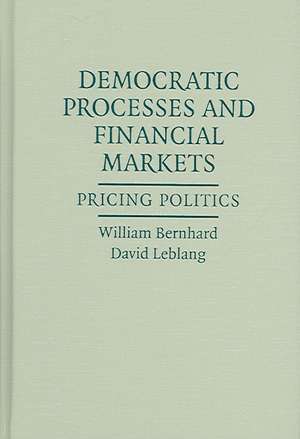Democratic Processes and Financial Markets: Pricing Politics
Autor William Bernhard, David Leblangen Limba Engleză Hardback – 23 iul 2006
Preț: 497.12 lei
Preț vechi: 558.57 lei
-11% Nou
Puncte Express: 746
Preț estimativ în valută:
95.14€ • 98.28$ • 79.18£
95.14€ • 98.28$ • 79.18£
Carte tipărită la comandă
Livrare economică 26 martie-09 aprilie
Preluare comenzi: 021 569.72.76
Specificații
ISBN-13: 9780521861229
ISBN-10: 0521861225
Pagini: 272
Ilustrații: 36 tables
Dimensiuni: 156 x 235 x 20 mm
Greutate: 0.48 kg
Ediția:New.
Editura: Cambridge University Press
Colecția Cambridge University Press
Locul publicării:New York, United States
ISBN-10: 0521861225
Pagini: 272
Ilustrații: 36 tables
Dimensiuni: 156 x 235 x 20 mm
Greutate: 0.48 kg
Ediția:New.
Editura: Cambridge University Press
Colecția Cambridge University Press
Locul publicării:New York, United States
Cuprins
1. Introduction; 2. Democratic processes and political risk: evidence from foreign exchange markets; 3. When markets party: stocks, bonds, and cabinet formations; 4. The cross-national financial consequences of political predictability; 5. Cabinet dissolutions and interest rate behavior; 6. Bargaining and bonds: the process of coalition formation and the market for government debt in Austria and New Zealand; 7. Time, shares, and Florida: the 2000 Presidential Election and stock market volatility; 8. Polls and pounds: exchange rate behavior and public opinion in Britain; 9. Conclusion: political predictability and financial market behavior.
Recenzii
'… combination of single case studies with broader cross-country analyses … not only provide the ground for … future research, but also are a great starting point for students of political economy that have not yet been exposed to research in this area.' Swiss Political Science Review
Notă biografică
Descriere
Shows how elections, cabinet formations, and government dissolutions affect asset markets.
